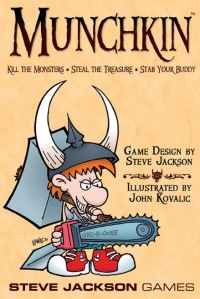This post was inspired by my response to Robert J. Schwalb’s blog post about the Killer DM within. A quick aside: I found Robert’s blog via a link on Sarah Darkmagic – a fellow RPG Blogger Network member whose blog I regularly follow. I love the way RPG Bloggers leads me to so many interesting items online.
Some dungeon masters / game masters hate power gamers. These are the players who try to find every possible advantage from any available material when putting their character together. If there’s an overpowered angle to take on a character, they’ll find and use it. This is sometimes referred to as “character optimization” or “CharOp”. Those who don’t approve might call it “being a munchkin” or “twinking”. This is the character who can easily kill monsters well above their own their level without breaking a sweat.
 Robert talks about the Killer DM having the potential to emerge when the DM is frustrated with the players and the way they’re playing the game. I think DMs in general are not fans of power gamers who min-max to the hilt.
Robert talks about the Killer DM having the potential to emerge when the DM is frustrated with the players and the way they’re playing the game. I think DMs in general are not fans of power gamers who min-max to the hilt.
Having thought this issue through, I’ve concluded that the problem isn’t exactly power gamers per se – you can always ramp up the difficulty to make it a challenge for them. The problem is when you have characters of vastly different power levels in the same party.
If everyone in the party is super-powerful for their level, then the DM’s job isn’t too hard – you use higher-level encounters, give monsters extra abilities that will make them more challenging, and so on. The problem is when one or two players are super-powerful but the others are of a normal power level. In that situation, ramping up the difficulty to challenge the power gamers will make the monsters just plain deadly to the rest of the party.
The same problem can occur in reverse if you have a party of mostly average-power characters and one or two characters who have terrible stats for combat (the weak but charismatic fighter, for instance). Those under-powered characters are not going to be able to fight interesting battles alongside their more powerful brethren and will be reduced to either standing in the back or getting themselves slaughtered.
In my opinion, the key to a fun gaming environment is to have a party of similarly-powered characters. They don’t have to be all the same power level, but they should be close. In that situation, the DM can create encounters that challenge everyone but that everyone can contribute to. That’s what we want as dungeon masters.
I’m happy to say that my online campaign feels like the party is pretty well balanced from a power perspective. When it comes to combat, everyone can contribute. If we ever got to the point that one character was simply outshining all of the others, I would talk to that player about ways to bring the character in line, because otherwise combats will be too easy or too deadly for some part of the party. A balanced-power party is a happy party.

I find almost the opposite to the DMs you mention. The problem players are (in a sane system) those who don’t pay any attention to character effectiveness. Damnit, guys! You’re playing characters who regularly fight for their life. Not trying to do what you can to survive isn’t roleplaying. It’s looking for a Darwin Award. (Although this means you need to strike a balance – what’s too min-maxed varies group by group).
That’s an interesting point. I never thought about the fact that some DMs might WANT their parties to be as optimized as possible. It does make sense, though!
In any case, I think it’s fine as long as EVERYONE in the party is optimized. If some are and some aren’t, it becomes more difficult for the whole group to have fun at once, in my opinion.